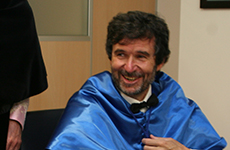Eduardo Balguerías Guerra
| Doctor: | D. Eduardo Balguerías Guerra |
| Propuesta: | Consejo de Dirección de la Universidad de Cádiz |
| Padrino: | Casimiro Mantell Serrano |
| Celebración: | Facultad de Ciencias. Salón de Actos. Campus de Puerto Real. 30 de mayo de 2018 |

Eduardo Balguerías Guerra (Madrid, 1957) es doctor en Ecología Marina por la Universidad de La Laguna (Tenerife), con el que obtuvo el Premio Extraordinario de Doctorado.
Sus líneas de investigación han estado siempre relacionadas con la evaluación de recursos vivos marinos, la biología pesquera y la ecología marina.
En el año 1982 ingresó en el Instituto Español de Oceanografía (IEO), ocupando desde junio de 2010 hasta la actualidad el cargo de director.
Ha sido representante científico de las administraciones española y europea, en multitud de grupos de trabajo y comités científicos relacionados con la conservación y gestión de los recursos vivos marinos.
Es autor de más de 70 publicaciones en diversas revistas científicas, nacionales e internacionales, e innumerables informes técnicos

